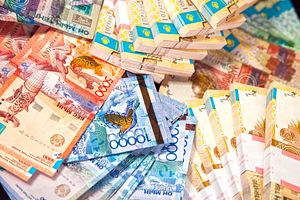As 2015 closes, Kazakhstan’s tenge has confirmed its position as the world’s worst-performing currency. The new low — 333.9 tenge per dollar — comes in the wake of another tumble in oil prices, which have dipped below $37 per barrel for the first time since 2009’s financial crisis. As Astana scrambles to curb speculation and manage the crisis, it’s unclear when relief for the country’s beleaguered economy is coming.
According to RFE/RL, the tenge has lost more than 80 percent of its value against the dollar since January. When 2015 began, the tenge was pegged to a range which Astana widened upward in July to between 198 per dollar and 170 per dollar. At the time, the then-governor of the National Bank, Kairat Kelimbetov, said Kazakhstan was moving toward a free float but that it would take three to five years. A month later, Kazakhstan made the sudden switch to a free float and the currency slid 30 percent. Over the months it has continued to slide.
In November, President Nursultan Nazarbayev replaced Kelimbetov with Daniyar Akishev. The tenge rested for most of the month around 307 per dollar before dropping. Last Wednesday the Kazakh prime minister, Karim Masimov, said the tenge had reached a “balanced position.”
Astana has floated several plans to get its financial house in order, including a privatization scheme and unburdening the National Bank of management of a massive pension fund. Nazarbayev, in his state address in November, encouraged all Kazakhs to “live within our means.” On Sunday, according to TASS, Nazarbayev said Kazakhstan would not impose a ban on currency export as part of its anti-crisis policy.
The tenge’s troubles are not the Kazakh economy’s only problems. As AKIpress reported recently, in 2015 Kazakhstan’s output of coal was 5.7 percent less than in 2014; its production of gasoline, diesel fuel, and heating oil also declined. Reductions in oil output were less, down by just under 2 percent; however, natural gas production increased nearly 2 percent. Growth in general has slowed, hitting an estimated low of 1.5 percent in 2015. The IMF expects Kazakhstan’s GDP to grow only slightly, at 2.4 percent, in 2016 — an estimate that was revised downward in October. While growth has slowed and the tenge no longer goes as far as it once did, Trend reports that housing prices are on the rise: in the first 11 months of 2015, prices for new housing rose by 11.7 percent.
One of the threats to Kazakhstan’s economy, and indeed those of nearly all oil exporters, is Iran’s reentrance to global markets. According to Bloomberg, Iran’s deputy oil minister for international and commerce affairs said there was “absolutely no chance” Iran will delay plans to increase oil shipments.
































